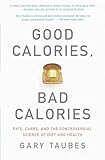Good calories, bad calories : fats, carbs, and the controversial science of diet and health / Gary Taubes.
Material type: TextPublication details: New York : Anchor, c2008.Description: xxv, 609 p. ; 24 cmISBN:
TextPublication details: New York : Anchor, c2008.Description: xxv, 609 p. ; 24 cmISBN: - 1400033462
- 9781400033461
- 613.2/83 22
- RM237.73 .T385 2007
| Item type | Current library | Home library | Shelving location | Call number | Status | Barcode | |
|---|---|---|---|---|---|---|---|
|
|
Main Campus Library | University of Eastern Africa, Baraton | Main Stack | RM237.73.T385 2007 (Browse shelf(Opens below)) | Available | 82816 |
Includes bibliographical references and index.
Prologue : A brief history of banting -- pt. 1. The fat-cholesterol hypothesis -- 1. The Eisenhower paradox -- 2. The inadequacy of lesser evidence -- 3. Creation of consensus -- 4. The greater good -- pt. 2. The carbohydrate hypothesis -- 5. Diseases of civilization -- 6. Diabetes and the carbohydrate hypothesis -- 7. Fiber -- 8. The science of the carbohydrate hypothesis -- 9. Triglycerides and the complications of cholesterol -- 10. The role of insulin -- 11. The significance of diabetes -- 12. Sugar -- 13. Dementia, cancer, and aging -- pt. 3. Obesity and the regulation of weight -- 14. The mythology of obesity -- 15. Hunger -- 16. Paradoxes -- 17. Conservation of energy -- 18. Fattening diets -- 19. Reducing diets -- 20. Unconventional diets -- 21. The carbohydrate hypothesis, 1 : fat metabolism -- 22. The carbohydrate hypothesis, 2 : insulin -- 23. The fattening carbohydrate disappears -- 24. The carbohydrate hypothesis, 3 : hunger and satiety -- Epilogue.
Not another diet book: After seven years of research in every science connected with the impact of nutrition on health, science writer Taubes shows that almost everything we believe about a healthy diet is wrong. We are taught that fat is bad for us, carbohydrates better, and that the key to a healthy weight is eating less and exercising more--yet we see unprecedented epidemics of obesity and diabetes. Taubes argues persuasively that the problem lies in refined carbohydrates, via their dramatic effect on insulin, and that the key to good health is the kind of calories we take in, not the number. He also argues that there is no compelling scientific evidence that saturated fat and cholesterol cause heart disease. Based on the evidence, he concludes that the only healthy way to remain lean is to eat fewer carbohydrates or to change the type of carbohydrates we eat.--From publisher description.
There are no comments on this title.

